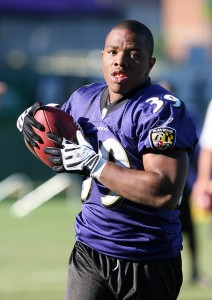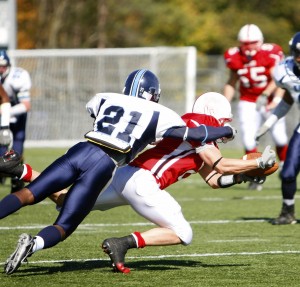
Image Credit: “Ray Rice” by Keith Allison is licensed under CC BY 2.0
These are not the NFL’s most shining years. Immediately following up on the rash of revelations about concussions, traumatic brain injuries and top-down neglect within the league’s most prestigious teams, the NFL is now facing another wave of disgrace.
This time, it concerns domestic violence.
The arrest of Ray Rice for beating his wife unearthed another, alarming trend. While overall arrest rates for NFL players are lower than the national average (the average man in his late 20s is about nine times more likely to be arrested than an NFL player for any cause), NFL players get arrested for domestic violence at an “extremely high [rate] relative to expectations,” according to Benjamin Morris, a writer at statistics-minded news blog FiveThirtyEight.
“Domestic violence accounts for 48 percent of arrests for violent crimes among NFL players, compared to [an] estimated 21 percent nationally.”
“Basically, NFL players are about four times more likely to be arrested for domestic abuse than you’d expect, based on their overall arrest rates. Counting Ray Rice, more than two-dozen pro football players have been arrested for domestic abuse in the past five years alone.”
A Link Between Brain Trauma and Violence?
Because the NFL’s statistics on concussions are incredulous, there are a lot of missing links in the possible theory of linking traumatic brain injury with a propensity to violence. Adrian Raine, a psychologist at the University of Pennsylvania who is the country’s foremost “neurocriminologist,” studies how brain function might explain criminal behavior.
Raine told Forbes:
“We all get aggressive at times. What stops us from lashing out? It’s a well-functioning prefrontal cortex … If you get a whiplash injury, the very front ridge of the brain is especially likely to be damaged. The region that is very much involved in emotion regulation.”
Whiplash-like injuries don’t just come from car accidents. They also take place, regularly and violently, on the football field.
In one recent study, Raine and a neuroscientist scanned the brains of men arrested for domestic abuse. They indeed found abnormalities in those brains, such as a hyperactive amygdala.
 It has been well documented by now that head injuries sustained by NFL players may lead to what’s known as chronic traumatic encephalopathy, or CTE. The disease seems to be slow but progressive; essentially, the brain deteriorates over time. Early CTE symptoms include impulsivity, explosivity and aggression. It’s the same disease that was found in the autopsy of Junior Seau, the former NFL star who committed suicide in 2012. Two years prior to his death, he was arrested on charges of assaulting his girlfriend.
It has been well documented by now that head injuries sustained by NFL players may lead to what’s known as chronic traumatic encephalopathy, or CTE. The disease seems to be slow but progressive; essentially, the brain deteriorates over time. Early CTE symptoms include impulsivity, explosivity and aggression. It’s the same disease that was found in the autopsy of Junior Seau, the former NFL star who committed suicide in 2012. Two years prior to his death, he was arrested on charges of assaulting his girlfriend.
A Tenuous Link
Still, the links between head injury and acts of intentional violence are very tenuous, and mainly anecdotal. Passionate football fans are joining with league administrators and coaches in denying the link’s plausibility.
In response, Adrian Raine offers a metaphor:
“It’s a bit like smoking and cancer. Does smoking cause lung cancer? Yes, but many people smoke and do not have cancer. But certainly smoking raises the odds of lung cancer, just as damage to the prefrontal cortex can raise the odds of impulsive, aggressive behavior.”
In Raine’s book, The Anatomy of Violence, he puts the matter even more succinctly:
“I do think we need to recognize that there’s more to domestic violence than … men’s using physical power to control women. We need to consider a contribution by the brain to spousal abuse.”
Who We Are
If you are suffering because of a traumatic brain injury, contact us at the Brain Injury Law Center. We have years of experience helping people obtain justice in the wake of life-altering brain injury. Call us at 757.244.7000 or fill out the form on the right side of this page for a free, no-obligation case evaluation.
image credit:


